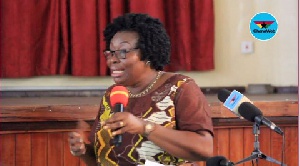Regional News of Wednesday, 19 August 2020
Source: GNA
Provide temporary shelters for socially vulnerable persons – Gender Activist
Dr Angela Dwamena–Aboagye, a Legal Practitioner and Gender Activist, on Tuesday called on the government to provide temporary shelters for persons accused of witchcraft and those socially vulnerable.
She said there is a need for clear leadership from the state to sustain the implementation of social laws that protect the vulnerable.
Dr Dwamena-Aboagye made the suggestion when the Sanneh Institute, an organization that focuses on research on religious and social issues, hosted a webinar on the theme: “Witchcraft, Religion, and Law in Ghana”.
Dr Dwamena-Aboagye, who is also the Founding Executive Director of the Ark Foundation, a non-governmental organization that addresses women’s human rights issues, said Ghana had failed to implement laws on social issues.
Referring to the 1992 constitution, the gender activist said Ghana’s laws enjoined the state to promote healthy cultural values, and question how many people accused of witchcraft can sue for defamation.
She further advised that the government should adopt the ageing policy to support the elderly who were often accused of witchcraft.
She advised churches to seek answers to issues related to the spiritual world, saying, “We cannot deny the existence of the spiritual world. For a long time, we haven’t taken social issues as seriously as we should.”
Sheikh Dr Seebaway Muhammed Zakaria, a Senior Lecturer, Department of Religion at Kwame Nkrumah University of Science and Technology (KNUST), pointed out that, in Islam, there is the belief that some people have the power to harm others.
He said the practice and belief in the existence of witchcraft were from time immemorial.
He said Moslems do protect themselves from such harmful persons by reciting verses from the Quran on protection or some use these verses to make amulets that serve as protection from evil.
Professor Opoku Onyinah, immediate past President of the Church of Pentecost, said though evil existed and the Bible made mention of the existence of witches and sorcerers, Christians should not fear witchcraft.
Quoting Exodus 22: 18 from the Bible, he said even though the King James Version says that “Do not suffer a witch to live, other translations use the word sorcerer, which has an entirely different meaning from witchcraft.
He urged Christians not to fear witches or any person with evil powers, saying, “The devil cannot overcome you as a Christian and do not encourage superstition.”
Dr John Azumah, Executive Director of the Sanneh Institute, said Europeans dealt with witchcraft with education and legislation.
He urged the government to implement laws that would strengthen the social structures and support socially vulnerable persons.











